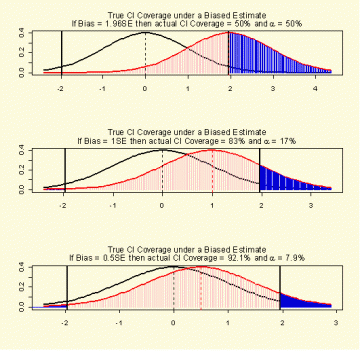Unbiased econometric estimates? Forget it! Following our recent post on econometricians’ traditional privileging of unbiased estimates, there were a bunch of comments echoing the challenge of teaching this topic, as students as well as practitioners often seem to want the comfort of an absolute standard such as best linear unbiased estimate or whatever. Commenters also discussed the tradeoff between bias and variance, and the idea that unbiased estimates can overfit the data. I agree with all these things but I just wanted to raise one more point: In realistic settings, unbiased estimates simply don’t exist. In the real world we have nonrandom samples, measurement error, nonadditivity, nonlinearity, etc etc etc. So forget about it. We’re living in the real world … It’s my impression that many practitioners in applied econometrics and statistics think of their estimation choice kinda like this: 1. The unbiased estimate. It’s the safe choice, maybe a bit boring and maybe not the most efficient use of the data, but you can trust it and it gets the job done. 2. A biased estimate. Something flashy, maybe Bayesian, maybe not, it might do better but it’s risky.
Topics:
Lars Pålsson Syll considers the following as important:
This could be interesting, too:
Robert Vienneau writes Austrian Capital Theory And Triple-Switching In The Corn-Tractor Model
Mike Norman writes The Accursed Tariffs — NeilW
Mike Norman writes IRS has agreed to share migrants’ tax information with ICE
Mike Norman writes Trump’s “Liberation Day”: Another PR Gag, or Global Reorientation Turning Point? — Simplicius
Unbiased econometric estimates? Forget it!
Following our recent post on econometricians’ traditional privileging of unbiased estimates, there were a bunch of comments echoing the challenge of teaching this topic, as students as well as practitioners often seem to want the comfort of an absolute standard such as best linear unbiased estimate or whatever. Commenters also discussed the tradeoff between bias and variance, and the idea that unbiased estimates can overfit the data.
I agree with all these things but I just wanted to raise one more point: In realistic settings, unbiased estimates simply don’t exist. In the real world we have nonrandom samples, measurement error, nonadditivity, nonlinearity, etc etc etc.
So forget about it. We’re living in the real world …
It’s my impression that many practitioners in applied econometrics and statistics think of their estimation choice kinda like this:
1. The unbiased estimate. It’s the safe choice, maybe a bit boring and maybe not the most efficient use of the data, but you can trust it and it gets the job done.
2. A biased estimate. Something flashy, maybe Bayesian, maybe not, it might do better but it’s risky. In using the biased estimate, you’re stepping off base—the more the bias, the larger your lead—and you might well get picked off …
If you take the choice above and combine it with the unofficial rule that statistical significance is taken as proof of correctness (in econ, this would also require demonstrating that the result holds under some alternative model specifications, but “p less than .05″ is still key), then you get the following decision rule:
A. Go with the safe, unbiased estimate. If it’s statistically significant, run some robustness checks and, if the result doesn’t go away, stop.
B. If you don’t succeed with A, you can try something fancier. But . . . if you do that, everyone will know that you tried plan A and it didn’t work, so people won’t trust your finding.
So, in a sort of Gresham’s Law, all that remains is the unbiased estimate. But, hey, it’s safe, conservative, etc, right?
And that’s where the present post comes in. My point is that the unbiased estimate does not exist! There is no safe harbor. Just as we can never get our personal risks in life down to zero … there is no such thing as unbiasedness. And it’s a good thing, too: recognition of this point frees us to do better things with our data right away.

